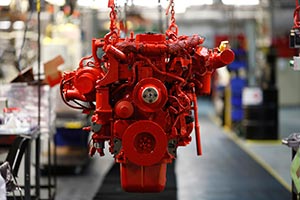EPA Certifies Cummins On-Highway Engines as Meeting 2017 GHG Standards

Cummins Inc., the only independent engine maker in the U.S. market, said earlier this month the Environmental Protection Agency has certified its on-highway diesel and natural-gas engines, ranging from 5 to 15 liters, as compliant with second step of the federal greenhouse gas and fuel-efficiency Phase I standards set to take effect in January 2017.
Editor's note: An earlier version of this story incorrectly stated that Cummins had been certified for Phase 2 standards.
The company attributed the gains to adjustments made through additional monitoring and sensors and said performance, reliability and efficiency refinements would continue in 2016.
“Cummins is committed to providing customer-focused innovation as soon as it is ready,” Amy Boerger, vice president of sales and support, said in a release.
Boerger said the 2016 ISX15 400-horsepower to 475-hp engines will provide customers with fuel economy gains of 2.5% on the base engine and up to 7.5% on engines with a SmartAdvantage powertrain — which uses an Eaton Fuller 10-speed automated manual transmission — with its SmartCoast features, compared with the 2013 ISX15.
Cummins said that with SmartCoast, the driveline disengages on moderate downhill grades, the engine returns to idle and drag is reduced.
The Columbus, Indiana-based manufacturer said the latest certifications build on efficiency enhancements it started in 2014 and 2015 that enable its engines to meet EPA 2016 and GHG 2017 requirements.
“Onboard diagnostics requirements are met with enhanced monitors, ensuring that exhaust tailpipe emissions stay within the EPA limits. A particulate matter sensor has been implemented, and electronic controls have been enhanced to interact with the diesel exhaust fluid quality sensor implemented by original equipment manufacturers of DEF tanks,” the announcement said.
Cummins added that its program called Cummins Care provides representatives around the clock to answer all “operational questions on topics such as fuel and oil specifications and maintenance intervals.”

